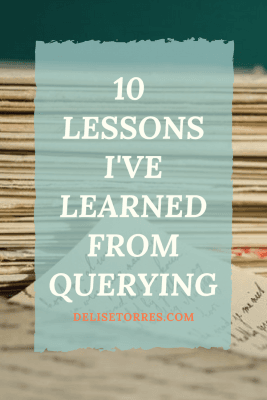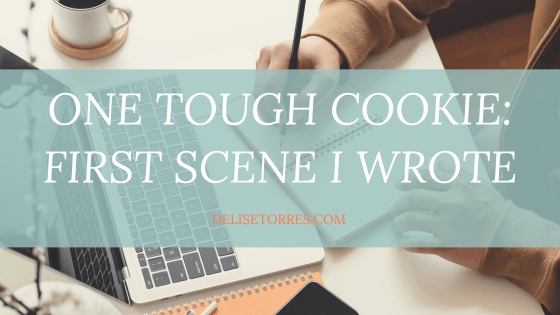I finished my first novel back in 2016 then started querying only to be faced with rejection and no requests. It took me a year to lick my wounds and start over. In April, I finished another round of revisions and sent a new batch of queries. This time, I finally got a full request! To date, I’ve sent 36 queries. Not a whole lot, but it’s been a learning experience and I wanted to share 10 lessons I’ve learned from querying (so far).
1. Have everything ready to go.
This was a tip I read somewhere. Agents usually ask for the first 5, 10, 20, or 50 pages. Have them already copied on separate documents ready to go. Since you’ll have to paste them directly into the body of the email, remove indentations and use single spacing. Also, keep a copy of them in double space for those agents who specify that as their preference.
2. Good structure in the novel = good structure in the query.
The query should cover from the inciting incident to the first plot point, giving a hint of what’s to come and what’s at stake for the character. So, basically a summary of the first act and a hint of the ending. If you structured your novel properly and know what these points are, you’ll have an easier time writing your query and synopsis.
3. The query must fit the genre.
My novel walks the line between Romance and Women’s Fiction. At its core, the novel is a romance, very focused on the romantic relationship between Gwen and Jeff. But because the novel’s structure and some plot points don’t fit the expectations for the genre, I have to market it as Women’s Fiction. That means focusing on Gwen’s journey and character arc, as well as incorporating non-romantic sub-plots to make it fit more into that genre.
4. You can never get enough feedback on your query letter.
On Scribophile, I joined a Query Bootcamp group where we all critiqued each other’s queries. At least 5 people gave me feedback. Then, after I started querying and didn’t get any requests, I got a critique from author Emily Layne, who helped me take it to the next level and get selected for the Twitter contest Nightmare on Query Street (#NoQS). Now, I’ve fixed it yet again to better reflect Gwen’s character arc. So, you will never know if your letter is ready until you get an agent.
5. Personalization is not as important as the pitch.
Doing your research is important so that you can better target your ideal agent, but the consensus between agents (as far as I’ve read) is to skip the chit-chat and go with the pitch. Unless you have a real connection to the agent (you met, you know one of their clients, or loved one of their client’s book, etc.), skip the intro.
6. Make sure your novel is starting at the right place.
So far we’ve covered the query, but what about your first pages? As mentioned in #4 above, I was chosen for #NoQS, so I knew my query was strong. So why wasn’t I getting any requests? I scheduled a meeting with an agent through The Manuscript Academy, and I learned the answer: I was starting in the wrong place! I had read that you should start with conflict, but I was starting right at the inciting event, where everything changes. I’ve since learned that you should start a little bit before the big change, to introduce the protagonists and make readers care about them before their world gets turned inside out. Once I understood that and fixed my opening scene, I got the aforementioned full request!
7. Pages & query must relate.
As I mentioned in #4, I recently fixed my query, even though it was already strong and well-written. After some feedback from #RevPit, I realized two things: (1) I still needed to make the query fit the Women’s Fiction genre and (2) Gwen’s character arc was not being adequately reflected. My first chapter starts with Gwen happy with her loving boyfriend. This was not covered in the query, which may have led to confusion. Confusion = agents think your novel is not well-structured and not ready = rejection.
8. Do not query too many agents at once.
As you may have noticed, I’ve had to fix my query and pages multiple times. If I had queried every agent on my list, I would’ve lost all my chances. Why? Well, most agents don’t want to be re-queried with the same manuscript unless some time has passed and it has gone through major revisions. Also, many agencies have a “no from one is a no from all” policy, so if you queried an agent from that agency you would lose your chances with all other agents.
Going in batches allows you to see what works. Don’t start with your top agents (like I did); wait until you get a request (which means your query and pages work). But then, only query 10 agents at a time. You never know what type of feedback you will get. If your manuscript needs major revisions, you’ve lost your chances with those agents you already queried.
9. Twitter is the place to be.
From pitch parties to contests, query tips, #askagent sessions, you definitely need to be on Twitter if you want to be published. Not only can you meet other writers going through the same things as you are, you will learn so much!
My first contest was #PitchSlam where I got feedback on my first page and pitch. I learned that I was starting with too much backstory, so I cut it. Being selected for #NoQS was a huge boost of morale. I also participated in #RevPit, and although I wasn’t chosen, I got some eye-opening feedback for my query. So go to Twitter and participate in everything you can. You never know what will happen!
10. Patience is truly a virtue (that I don’t have).
Querying = waiting weeks to hear back (or maybe never getting any response). You really have to stay calm and do something else, like write another novel. If you really want to have a career as a writer, you need to write many books, so why wait until you have an agent? Keep writing and eventually, it will happen!
That’s all from me, what about you? What lessons have you learned by querying? Do you relate to my list? Let me know in the comments below.











